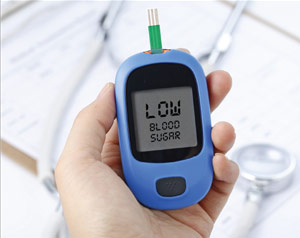 Measuring blood sugar (blood glucose) levels is one of the most critical things people with diabetes can do to manage their condition and prevent complications. Testing is especially important for people at risk of low blood sugar, or hypoglycemia.
Measuring blood sugar (blood glucose) levels is one of the most critical things people with diabetes can do to manage their condition and prevent complications. Testing is especially important for people at risk of low blood sugar, or hypoglycemia.
Glucose is the source of energy used by your brain and your body to function properly. If there is not enough glucose circulating in your blood, you can experience unpleasant or even dangerous consequences. Glucose levels that are too high (called hyperglycemia) can lead to complications including cardiovascular (heart and blood vessel) disease, damaged organs, foot sores, problems with your bones, loss of vision, and tooth and gum infections. Low blood glucose levels (called hypoglycemia) can be very serious as well. Complications can include a reduced ability to think, learn, remember, and make decisions but it can also
lead to passing out, coma, or even death in some cases. Repeated episodes of low glucose can also cause a condition called hypoglycemia unawareness, in which you become so used to the symptoms that you don’t realize that what you are feeling is due to low blood glucose. When this happens, your brain may not work properly, and you could have a seizure or lose consciousness. This is a dangerous situation and must be treated right away.
WHO IS LIKELY TO HAVE LOW BLOOD SUGAR?
Low blood sugar is more common in people with diabetes who use insulin or take certain other diabetes medicines like glyburide, glimepiride, or glipizide. Combining these drugs with certain other medications can increase your risk. Ask your London Drugs pharmacist if you are at risk of hypoglycemia and make a treatment plan for what to do if it occurs. Other factors that make it more likely a person will experience hypoglycemia are being aged 65 or older, having had episodes of low blood sugar in the past, or having other health problems such as heart or kidney disease. Hypoglycemia can also be the result of not eating enough food, not eating on schedule, drinking alcohol, and engaging in unplanned physical activity. People taking insulin are particularly at risk of hypoglycemia if they mistakenly use more insulin than they need.
A STEP IN THE RIGHT DIRECTION
Fortunately, there are some steps you can take to protect yourself from hypoglycemia. The first step is to know the warning signs of low blood sugar and watch for them. You may be experiencing mild to moderate hypoglycemia if:
- You are dizzy, lightheaded, confused, or irritable
- You are hungry
- You are tired
- You feel jittery or shaky
- You are unable to see or speak clearly
- You have a headache
- Your heart is beating too fast or is not beating steadily
When low blood glucose occurs during sleep, you may cry out, have nightmares, or sweat enough to make your pajamas or sheets damp. When you wake up, you may feel tired, irritable, or confused. When your blood sugar drops very low, your brain may not work properly, and you may have a seizure or lose consciousness. This is a dangerous situation and must be treated right away.
TREATING HYPOGLYCEMIA
Speak with your healthcare team before you experience a hypoglycemic episode so you will know what to do if it happens to you, and make sure you always have a glucose monitor to test your blood sugar level and the appropriate remedies with you. It is important to treat low blood sugar by bringing your glucose level up right away. For mild to moderate hypoglycemia, start by eating or drinking 15 grams of fast-acting sugar. Liquid sources will work faster than solids. Good choices for an adult include:
- 4 or 5 glucose or dextrose tablets (available for purchase at a pharmacy)
- 1 tablespoon (15 mL) of honey
- 1 tablespoon (15 mL) of sugar dissolved in water
- 2/3 cup (150 mL) of juice or a regular (not sugar-free) soft drink
- 6 Life Savers® candies or 2 rolls of Rockets Candy®
These amounts may not be appropriate for a child. Anyone at risk of hypoglycemia should always have an emergency form of glucose available to use if they are not able to swallow or are unconscious. If the person becomes sleepy or sluggish or if the person is unconscious, call 9-1-1 or your local emergency service and begin treatment immediately. Fast acting treatments include Glucagon nasal spray or injection, or glucose gel applied to the inside cheek of their mouth. Be sure that all household members and caregivers know how to use these in an emergency.
After attempting to treat hypoglycemia, wait 15 minutes and recheck your blood glucose level. Generally, the goal is a blood glucose reading of 3.9 mmol/L or above if your next meal is within an hour. If after 15 minutes your blood sugar is still below 3.9 mmol/L, consume another 15 grams of fast-acting sugar and retest your blood glucose again 15 minutes later.
Once your glucose is above 3.9 mmol/L you need to eat. If your next meal is more than an hour away, eat a starchy snack (such as one slice of bread or seven crackers) and some protein (such as one piece of cheese or two tablespoons [30 mL] of peanut butter) to help keep the blood glucose in range. Do not eat protein or fat until your sugar is in range, as it slows the absorption of glucose. If you need to go somewhere by car, wait until your blood sugar level is above 5 mmol/L before driving, or let someone else drive. It can take up to 40 minutes for your brain to function normally again, so you can drive safely. Hypoglycemia may be frightening to think about, but with some planning you can respond quickly to avoid dangerous consequences.
Always have your treatments on you, and make sure that those with you know how to recognize the symptoms of low blood sugar and how to help you in an emergency. Speak to your doctor or pharmacist to make sure you know if your medications put you at risk of hypoglycemia and have a clear plan ready to execute if needed.

 Breast cancer is the second most common cancer in Canada, but it’s the most common cancer among women. One in eight women will be diagnosed with breast cancer in her lifetime. Fortunately, 82% of breast cancer cases in women are diagnosed early, increasing the likelihood of survival. In fact, nearly 90% of women in Canada survive for at least five years after a breast cancer diagnosis. Much of this positive survival rate is due to screening for the disease. Not only does breast cancer screening increase survival, it provides other benefits as well. When breast cancer is detected early, it can mean less treatment and a shorter time recovering,
Breast cancer is the second most common cancer in Canada, but it’s the most common cancer among women. One in eight women will be diagnosed with breast cancer in her lifetime. Fortunately, 82% of breast cancer cases in women are diagnosed early, increasing the likelihood of survival. In fact, nearly 90% of women in Canada survive for at least five years after a breast cancer diagnosis. Much of this positive survival rate is due to screening for the disease. Not only does breast cancer screening increase survival, it provides other benefits as well. When breast cancer is detected early, it can mean less treatment and a shorter time recovering, Screentime before bed can negatively affect your sleep
Screentime before bed can negatively affect your sleep Don’t let these common diseases take your breath away.
Don’t let these common diseases take your breath away. Many people use the term flu to refer to any illness caused by a virus, such as the common cold or stomach flu, and this can lead to confusion. However, the influenza virus causes a respiratory illness that tends to be more severe than these viruses and is more likely to cause complications. So, lets discuss some concerns that are common, information currently available and the recommendations that Health Canada provides about the flu vaccine.
Many people use the term flu to refer to any illness caused by a virus, such as the common cold or stomach flu, and this can lead to confusion. However, the influenza virus causes a respiratory illness that tends to be more severe than these viruses and is more likely to cause complications. So, lets discuss some concerns that are common, information currently available and the recommendations that Health Canada provides about the flu vaccine.

